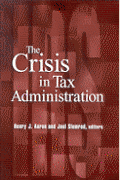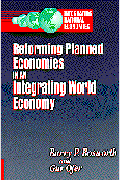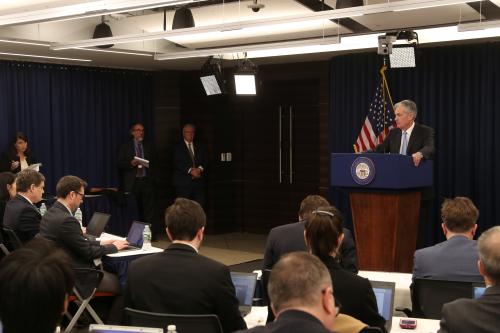Studies in this week’s Hutchins Roundup find firms’ reaction to the recent corporate tax cut depends on both economics and politics, economic expansion do die of old age in the United States, and more.
Want to receive the Hutchins Roundup as an email? Sign up here to get it in your inbox every Thursday.
Both political and economic factors are behind firms’ announcements after the Tax Cuts and Jobs Act
Michelle Hanlon of MIT, Jeffrey Hoopes of University of North Carolina, and Joel Slemrod of University of Michigan examine how companies responded to the Tax Cuts and Jobs Act (TCJA) by looking at their statements, quarterly filings, and conference call transcripts from the first quarter of 2018. Of the 4,034 firms in their sample, 4 percent announced that they would pay some portion of their tax savings to workers. Twenty-two percent of the 424 S&P 500 firms in their sample mentioned in earnings conference calls that they would increase investment because of TCJA. Although there was an increase in share repurchases after the tax bill passed, only nine of 179 firms’ announcements explicitly attributed a share repurchase plan to TCJA. The authors measure how much companies expect their tax rates to decline using forecasts of effective tax rates in earnings conference calls and find that companies that expected their tax rates to decrease the most were more likely to announce worker-related benefits and increased investment because of TCJA. However, corporations with political action committees that donated more to Republican candidates than Democratic candidates in 2015 and 2016 were also more likely to announce worker benefits from TCJA. This suggests that announcements were driven by both political and economic factors, the authors say.
US expansions are more likely to end as they get longer and if recessions hit other G-7 economies
Examining business cycles from 1948 to 2016, Gabe de Bondt and Philip Vermeulen of the European Central Bank find that the oft-cited adage “expansions don’t die of old age” is true in five of the Group of Seven (G-7) countries, but not in the United States and Germany where older expansions are more likely to end than younger ones. The authors also show that the probability that an expansion ends in a G-7 country roughly doubles each time another G-7 country falls into a recession, suggesting that spillovers from other large economies can substantially increase the risk that an expansion ends. The probability of climbing out of a recession, on the other hand, rises over time in all G-7 countries and doesn’t depend on the other G-7 countries’ business cycles.
Pension rules influence the labor supply decisions of Illinois teachers
Many public pension plans restrict the number of hours a pensioner can work and still draw retirement benefits. Maria Fitzpatrick of Cornell University examines how teachers in Illinois responded to a 2001 rule change that increased retirees’ allowed work hours. Comparing teachers who were affected by this change with those who were not (teachers in subject areas with personnel shortages), she finds that the increase in the maximum allowed work hours boosted part-time work among retirees, but had no effect on employees’ retirement decisions. She concludes that these policies appear to be constraining the labor supply decisions of some retirees and should be considered carefully when devising policies to extend the length of working lives or improve the health of pension systems.
Chart of the week: The United States has surpassed Russia and Saudi Arabia to become the world’s largest crude-oil producer

Quote of the week:
“U.S. monetary policy has for some time and will, I believe, continue to be data dependent in the sense that incoming data reveal at the time of each Federal Open Market Committee (FOMC) meeting where the economy is at the time of each meeting relative to the goals of monetary policy. This information on where the economy is relative to the goals of monetary policy is an important input into the policy decision. … Data dependence in this sense is easy to understand, as it is of the type implied by a large family of policy rules in which the parameters of the economy are known,” says Richard Clarida, vice-chairman of the Federal Reserve Board
“But what if key parameters that describe the long-run destination of the economy are unknown? This is indeed the relevant case that the FOMC and other monetary policymakers face in practice. The two most important unknown parameters needed to conduct‑‑and communicate‑‑monetary policy are the rate of unemployment consistent with maximum employment, u*, and the riskless real rate of interest consistent with price stability, r*. As a result, in the real world, monetary policy should, I believe, be data dependent in a second sense: that incoming data can reveal at each FOMC meeting signals that will enable it to update its estimates of r* and u* in order to obtain its best estimate of where the economy is heading. … This process of learning about r* and u* as new data arrive supports the case for gradual policy normalization, as it will allow the Fed to accumulate more information from the data about the ultimate destination for the policy rate and the unemployment rate at a time when inflation is close to our 2 percent objective.”
The Brookings Institution is committed to quality, independence, and impact.
We are supported by a diverse array of funders. In line with our values and policies, each Brookings publication represents the sole views of its author(s).










Commentary
Hutchins Roundup: Tax reform, business cycle length, and more
November 29, 2018
Studies in this week’s Hutchins Roundup find firms’ reaction to the recent corporate tax cut depends on both economics and politics, economic expansion do die of old age in the United States, and more.